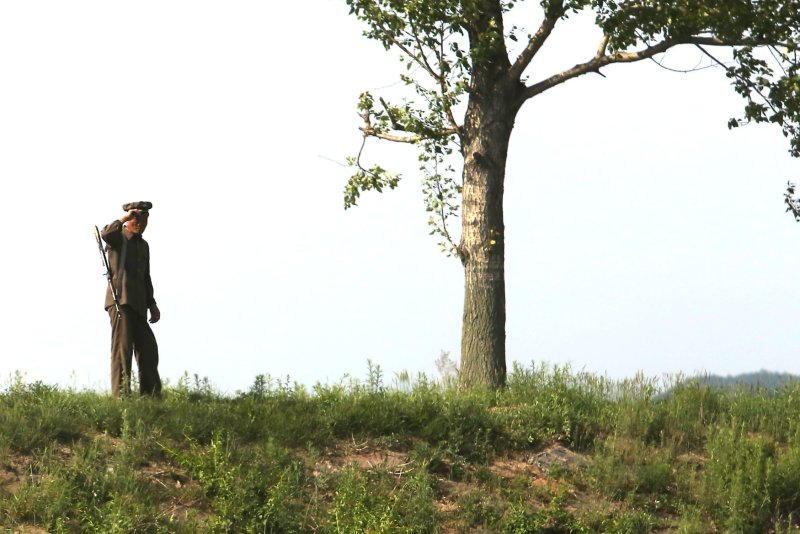
A North Korean solider patrols the border near the North Korean city
Sinuiju, across the Yalu River from Dandong, China’s largest border city
with North Korea. Pyongyang has signaled it has no intention of giving
up nuclear weapons but it is still seeking dialogue with the United
States, a South Korean analyst said. File Photo by Stephen Shaver/UPI
| License Photo
SEOUL, June 14 (UPI) — North Korea is likely to conduct a fifth nuclear test during the months leading up to the U.S. presidential elections, a South Korean analyst said Tuesday.
Lee Su-seok, a senior analyst at the Institute for National Security
Strategy in Seoul, said at a symposium Pyongyang’s possession of nuclear
weapons has been presented to the world as a “fait accompli” and will be used to develop its foreign policy, Yonhap reported.
North Korea will also probably use all means at its disposal to break away from sanctions, and try to persuade the United States to return to the negotiating table. In the run-up to the elections, the North could show a willingness to improve relations with the future U.S. president, Lee said.
But Pyongyang is not going to give up its nuclear weapons for dialogue and wants instead to use talks to gain recognition.
If that doesn’t work, additional nuclear tests are likely, the analyst said, because North Korea wants to prove to the international community the implementation of sanctions isn’t having the intended effect.
Washington has said it is open to dialogue with Pyongyang but only on the condition it is willing to give up its nuclear weapons.
Other factors, such as the domestic situation in North Korea, could play a role in the country’s future decisions, Lee said.
North Korea’s socioeconomic elite could be buckling under the pressure of the sanctions and with economic difficulty the loyalty of North Korea’s military could start to wane. In which case, Lee said, the leadership could conduct a nuclear test to cement the authority of the regime.
North Korea denuclearization is a high-priority policy in South Korea, where President Park Geun-hye said Tuesday the country is facing a critical challenge in North-South relations. Park urged for national unity on the matter.
North Korea will also probably use all means at its disposal to break away from sanctions, and try to persuade the United States to return to the negotiating table. In the run-up to the elections, the North could show a willingness to improve relations with the future U.S. president, Lee said.
But Pyongyang is not going to give up its nuclear weapons for dialogue and wants instead to use talks to gain recognition.
If that doesn’t work, additional nuclear tests are likely, the analyst said, because North Korea wants to prove to the international community the implementation of sanctions isn’t having the intended effect.
Washington has said it is open to dialogue with Pyongyang but only on the condition it is willing to give up its nuclear weapons.
Other factors, such as the domestic situation in North Korea, could play a role in the country’s future decisions, Lee said.
North Korea’s socioeconomic elite could be buckling under the pressure of the sanctions and with economic difficulty the loyalty of North Korea’s military could start to wane. In which case, Lee said, the leadership could conduct a nuclear test to cement the authority of the regime.
North Korea denuclearization is a high-priority policy in South Korea, where President Park Geun-hye said Tuesday the country is facing a critical challenge in North-South relations. Park urged for national unity on the matter.
 | June 14, 2016 at 12:02 PM
| June 14, 2016 at 12:02 PM